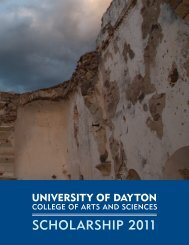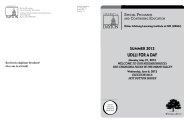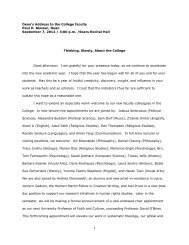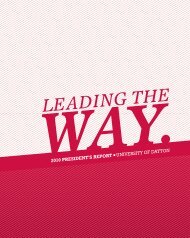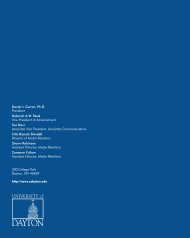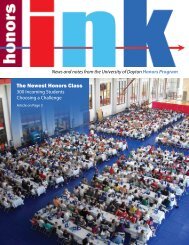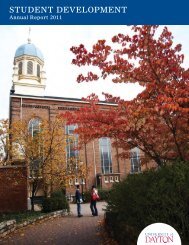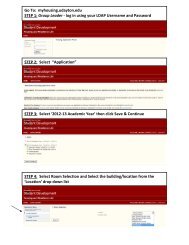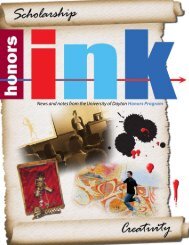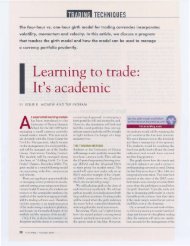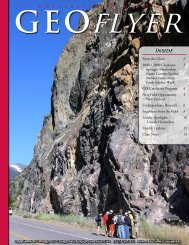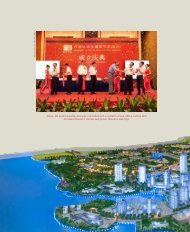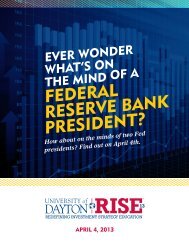Stander Symposium abstract book - University of Dayton
Stander Symposium abstract book - University of Dayton
Stander Symposium abstract book - University of Dayton
You also want an ePaper? Increase the reach of your titles
YUMPU automatically turns print PDFs into web optimized ePapers that Google loves.
9:00 AM to 5:00 PM<br />
RELIGIOUS STUDIES<br />
The Contested Body: Mystical Body <strong>of</strong> Christ Theologies in Early Twentieth Century Europe<br />
Presenter(s): Timothy R Gabrielli<br />
Advisor(s): William Portier<br />
Religious Studies<br />
Graduate Research<br />
122<br />
11:00 AM-11:30 AM<br />
LTC - Team Space<br />
This paper, supported by a Graduate School Summer Fellowship, analyzes the burgeoning <strong>of</strong> mystical body <strong>of</strong> Christ theology in Europe during<br />
the first part <strong>of</strong> the twentieth century, particularly during the Great Depression and the Second World War. It argues that mystical body theology<br />
was a rather slippery image that theologians needed to “ground” in some more concrete reality. As such, what is referred to as the “virtual explosion”<br />
<strong>of</strong> mystical body theology in the 1920s and 1930s was not monolithic. A careful look at this “explosion” evinces various schools - mystical<br />
body theologies (plural) - centered on where or what made the mystical body <strong>of</strong> Christ more concrete in various cases. Roman theologians <strong>of</strong>ten<br />
grounded the mystical body <strong>of</strong> Christ firmly in the visible Roman Catholic Church. Some, mostly German, theologians grounded the mystical body<br />
in the nation-state. Karl Adam had this second tendency; he found, and developed, affinities between mystical body theology and the racial politics<br />
<strong>of</strong> the rising Nazi regime, emphasizing the purity <strong>of</strong> bloodlines and the strength <strong>of</strong> the body politic. Other, mostly French, theologians saw the<br />
mystical body <strong>of</strong> Christ as inseparable, indeed primarily grounded in, the liturgical and sacramental life <strong>of</strong> the Church. Lambert Beauduin, Henri de<br />
Lubac, and Virgil Michel (on this side <strong>of</strong> the Atlantic) stand in this last stream. This paper argues that the mystical body theology <strong>of</strong> this last group<br />
was the most fruitful, opening up avenues for Church reform rooted in solidarity.<br />
Just War as Christian Discipleship: A Critical Examination<br />
Presenter(s): Herbert D Miller<br />
Advisor(s): Kelly S Johnson<br />
Religious Studies<br />
1:20 PM-1:40 PM<br />
Graduate Research Marianist Hall Learning Space - 206<br />
Christians have wrestled with the theological and ethical implications <strong>of</strong> participating in warfare from the earliest days <strong>of</strong> the faith. One can<br />
find within the Christian theological tradition support for a range <strong>of</strong> positions regarding war, from absolute pacifism to just war to holy crusade.<br />
Theologian Dan Bell’s <strong>book</strong> Just War as Christian Discipleship engages this tradition and argues that just war “is an expression <strong>of</strong> the Christian<br />
community; an outgrowth <strong>of</strong> its fundamental confessions, convictions, and practices; an extension <strong>of</strong> its consistent, day-to-day life and work on<br />
behalf <strong>of</strong> justice and love <strong>of</strong> neighbor (even enemies) in the time and realm <strong>of</strong> war.” Writing as a Christian theologian, Bell wants to make explicit a<br />
conviction that many Christians hold dear, namely that participation in war may not be an inherently evil act, but can be an act <strong>of</strong> love. In this session,<br />
I will discuss how Bell’s thesis stands in contrast to contemporary just war theories and what he can add to these discussions. I will conclude<br />
by highlighting a few concerns I have about his project.<br />
The Wisdom <strong>of</strong> Style: experiments with genre in recent Christian theology<br />
Presenter(s): Matthew D Archer<br />
Advisor(s): Matthew W Levering<br />
Religious Studies<br />
3:00 PM-3:20 PM<br />
Graduate Research Kennedy Union - 222<br />
The question <strong>of</strong> genre is emerging as a crucial topic in Christian theology. Some authors are calling for a shift in academic theology towards a way<br />
<strong>of</strong> writing that is more attuned to the needs <strong>of</strong> local church communities. In addition, academic writing, in the form <strong>of</strong> papers at conferences,<br />
scholarly articles, and <strong>book</strong>s, is not the only way that theologians work in their fields. Theologians sometimes write novels, poetry, or sermons<br />
along with their more academic-level output. This paper will ask two questions: (1) what can we learn about theology through looking at work by<br />
theologians in other genres? And (2) do these genres enable theologians to achieve certain insights that writing in a more academic form could<br />
not? This project looks at some works in nonacademic genres by pr<strong>of</strong>essional academic theologians. It does not look at those who write chiefly as<br />
poets who also demonstrate a Christian perspective or works <strong>of</strong> literature that have themes that could be related to Christianity or explicitly draw<br />
on the Christian tradition. For this presentation, I will focus on two pr<strong>of</strong>essional academic theologians: Rowan Williams and James McClendon.



